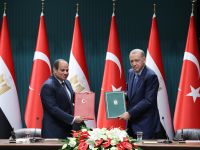The Emirates Institution for Advanced Science and Technology, also known as EIAST, is on track to build the first Arab-made satellite — expected to be in the Earth’s orbit by 2017, its senior official says.
Omran Sharaf, director of Programme Management Department, EIAST, said Khalifa Sat project will be a 100 per cent Emirati satellite and will boost the UAE space programme.
“The first two projects namely Dubai Sat-1 and Dubai Sat-2 were developed outside the country. But Khalifa Sat will be completely developed in the country. Currently, our team is based in South Korea, but it will be shifted to the UAE by the end of this year and hopefully we can localise all activities for the development of the first Arab-made satellite in the UAE,” Sharaf told Khaleej Times on the sidelines of the third World Space Risk Forum 2014 here on Wednesday.
His Highness Shaikh Mohammed bin Rashid Al Maktoum, Vice-President and Prime Minister of the UAE and Ruler of Dubai, launched the initial phase of Khalifa Sat project in December last year. The satellite, the third that will be launched by Dubai and EIAST, will be constructed entirely by 45 Emirati engineers, after the first in 2009, was a largely South Korean production with input from Emirati scientists.
The second, Dubai Sat-2 project launched in November 2013, had double the number of UAE engineers working, but still had input from South Korea.
Sharaf, who delivered a welcome message at the forum’s opening ceremony, said Khalifa Sat project is still in initial phase and the Emirati team is developing the engineering model of the satellite to be used for functional verification of the system.
“Khalifa Sat is an imaging satellite to be used for urban planning, humanitarian support assistance, and monitoring of projects in the UAE, among others,” he said.
“We’re renting out facilities in South Korea to use it until EIAST facilities in Dubai are ready. Hopefully the whole team will be shifted to Dubai by the end of the year, and we will start working on the satellite’s flight model that will be launched into space in 2017 as per schedule,” Sharaf said.
To a question, he said EIAST will definitely come up with new projects, but currently “we’re focusing on Khalifa Sat and shifting the activities to Dubai from South Korea.
“I think, hopefully, we’ll be able to start new innovative projects soon after shifting the base to Dubai,” he said.
About the outlook for space industry, he said: “It looks very good. There’s big demand for space technologies and applications.”
“As you know there are different initiatives within the UAE. We have many different initiatives like the Thuraya, DubaiSat satellite series, Khalifa Sat and the Yahsat. Definitely, I think the role of technology will be growing. Space technology is embedded currently in the many different systems that we use.”
In reply to a question about EIAST role in space programme, he said it is basic responsibility of his organisation to layout the solid foundations to boost science and technology in the country.
“Basically EIAST is established to build up the science and technology sector within the UAE and develop the industry to reach levels that will be able to contribute to compete and be recognised internationally at the same level as other advanced nations.
“The main thing that we’re doing is that we’re trying to get the knowledge that will help us build our systems. Our mandate is to build the science and technology sector in the UAE, space programme is one of the main plans we have, but our main objective and goal is to support the sector within the UAE by developing a conducive environment for scientists and engineers in the country.”
About the challenges being faced to achieve its objective, he said: “There’s always challenges; we definitely need more engineers and scientists. EIAST is trying to promote and encourage students to be specialised in areas such as mechanical, electrical, computer and software engineering.”
Sharaf said EIAST believes in promoting the local talent in key areas of science and technology. “We have 100 per cent Emiratisation at EIAST with total strength of around 80 employees,” he said.








